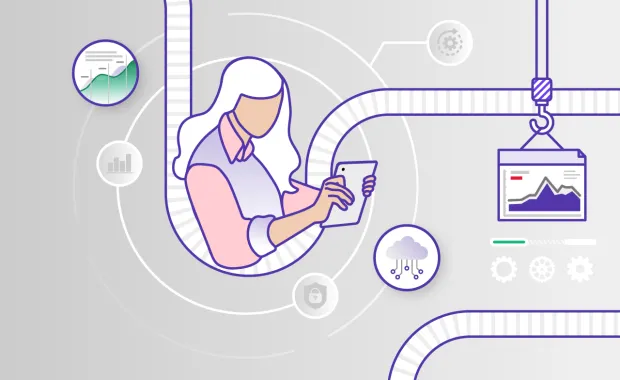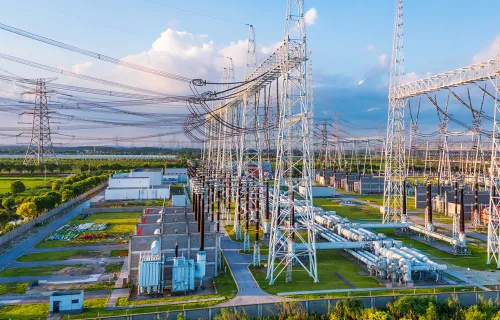Explore key topics in this blog
The nature of disruption has changed. It’s no longer episodic; it’s systemic, simultaneous and accelerating. Geopolitical uncertainty, climate volatility and shifting consumer expectations are influencing core operational and strategic decisions every day. In this new reality, agility alone is no longer enough. What supply chains need now is foresight; the ability to see around corners, not just dodge obstacles.
For leaders, it means anticipating what’s ahead and having the ability to adapt—intelligently and responsibly—before disruption takes hold. In short, there’s an urgent need to shift from reactive supply chains to predictive ecosystems.
This shift hinges on four enablers: digital twins, agentic AI, data sovereignty and the emerging potential of quantum computing.
De-risking supply chain decisions with digital twins
Supply chains have long been managed as linear systems. Yet, in reality, they are dynamic, interdependent ecosystems. Digital twins capture this reality by providing a continuously updated virtual replica of supply chain operations, enabling organizations to simulate, test and adjust in real time.
In commercial supply chains, digital twins are proving critical for modelling supplier risk, testing reconfiguration scenarios, and optimizing logistics operations before deploying change. They provide the space to ask, “What if?” without exposing the business to real-world risk.
In the public sector, where supply chains provide essential services such as health, energy, or emergency response, this capability is equally vital. Governments and public sector institutions can use digital twins to prepare for population surges, simulate energy demand, or rehearse crisis response, all without exposing citizens or infrastructure to risk.
To be effective, digital twins must be rooted in accurate operational data and continuously updated. With disciplined implementation, they move beyond a visualization tool to become a strategic engine for predictive insight and operational confidence.
Using agentic AI to enable responsiveness with responsibility
AI is evolving from rule-based automation to agentic systems, i.e., AI that can perceive, decide and act in real time. This shift is especially transformative in supply chains.
Across both commercial and citizen supply chains, AI agents can play a vital role in managing real-time decisions, for example, rerouting critical goods during a natural disaster or triggering emergency stock replenishment based on predictive insights. The goal goes far beyond just efficiency; it’s about enabling responsiveness with responsibility.
But this shift requires trust that is built on transparency, explainability and clear human oversight. AI systems must work alongside experienced professionals to enhance human decision-making, not replace it. To do so requires embedding frameworks that define the roles of AI agents, the boundaries in which they operate, and how exceptions are escalated.
Good quality data remains foundational to success. Without access to complete, real-time information across the ecosystem, agentic AI cannot perform as intended. Organizations looking to scale AI must first address their data-sharing and integration maturity—and do so in a way that protects sovereignty and security.
Protecting trust and resilience with sovereign, shareable data
Even the most advanced AI is only as effective as the ecosystems it operates within. Here, a critical gap remains. According to the latest CGI Voice of Our Clients research, 94% of executives report having a defined digital strategy, yet only 41% are achieving the expected results from their strategies. A key barrier is the lack of real-time data sharing between ecosystem partners. Without a shared view, collaboration becomes guesswork.
Data-sharing ecosystems create a unified operating picture—from local governments to global suppliers. They turn fragmentation into foresight, enabling stakeholders to anticipate disruptions, optimize resources and take unified decisions.
Layer in AI, digital twins and predictive models, and supply chains shift from being reactive to becoming predictive: vaccines can be rerouted before shortages, food can be redirected before it spoils, and infrastructure can be protected before climate events.
But with greater transparency comes greater responsibility. Where is the data stored? Who controls it? Which laws apply when something goes wrong?
This is where data sovereignty moves from a compliance concern to a strategic enabler. Especially within citizen supply chains, where systems manage sensitive personal and infrastructure data, control over where and how data is stored is critical. If data crosses borders without safeguards, entire ecosystems can become vulnerable—not just to compliance risk, but to operational collapse and loss of citizen trust.
Data sovereignty ensures that information remains subject to the laws and governance frameworks of the country or region where it originates. In a European context, policies like the EU Data Act and European Health Data Space (EHDS) reinforce the importance of keeping citizen data within trusted jurisdictions—not to limit progress, but to enable it responsibly.
For large public supply chain networks that procure, store, transport and distribute essential goods and services, data sovereignty is the bedrock of trust. When data is traceable, governed and protected, trust is preserved, and resilience grows stronger.
Anchoring data locally while enabling controlled, standards-based sharing enables organizations to:
- Comply with national and sector-specific regulations without slowing innovation
- Contain cybersecurity risk by reducing exposure and standardizing enforcement
- Shield critical infrastructure from exploitation
- Build citizen trust and encourage participation in data-driven services
Catena-X offers a great example from the automotive sector. It creates an open, collaborative data ecosystem where companies securely share standardized information across the entire value chain. By applying common standards that foster trust, enable interoperability and increase transparency, Catena-X empowers participants to control their own data, while strengthening the resilience and efficiency of supply chains. I invite you to watch my colleague Helena Jochberger’s interview on how data-sharing ecosystems are redefining supply chain resilience and unlocking future-ready strategies.
In real-world emergencies, timely and trusted data forms the foundation of resilience. As climate change fuels more frequent and severe weather events, predictive insights help communities prepare, respond and recover faster. From using satellite data, to improve storm surge warnings to combining Earth observation feeds and AI to map wildfires, to leveraging real-time weather data to automatically close flood barriers, CGI helps clients use data to drive smarter decisions and more resilient disaster management. Read more about these solutions.
Quantum: the competitive edge to prepare for
While digital twins and AI are reshaping today’s supply chains, quantum computing represents a longer-horizon, but equally critical, enabler of predictive capability.
Quantum’s promise lies in its ability to solve optimization and simulation problems that would take regular computers weeks—or even years—to complete. These include challenges such as dynamic route optimization across global networks, energy-efficient production scheduling, and simulating large-scale disruptions under multiple constraints.
Industry is beginning to recognize the near-term potential of quantum applications in supply chains. SAP, for instance, forecasts that quantum simulation could reduce logistics planning from days to hours. Academic institutions and national laboratories are also exploring the role of quantum in resilient infrastructure planning, disaster recovery, and logistics efficiency.
While mainstream adoption is still some way off, forward-looking organizations are preparing now by identifying use cases, training teams and embedding governance frameworks that can evolve alongside quantum capabilities.
Grounding strategy in foresight, responsibility and trust
It’s increasingly clear that the challenges—and opportunities—facing commercial and citizen supply chains are converging.
A commercial supplier navigating trade disruptions and a national health agency preparing for a health crisis may have different regulations and funding structures. Yet, their operational needs are remarkably similar: real-time insight, predictive planning, secure data exchange and trust-based collaboration.
It is also clear that resilience can no longer be built in isolation; it must be designed for the entire ecosystem. The technologies discussed here—AI, digital twins, data-sharing platforms and quantum—are not industry- or sector-specific. Their value depends on how effectively they are integrated, governed and aligned to purpose.
For leaders, resilience is less about systems and more about mindset. Those who ground strategy in foresight, responsibility and trust will be best positioned to navigate their organizations through uncertainty with confidence.
Back to top




